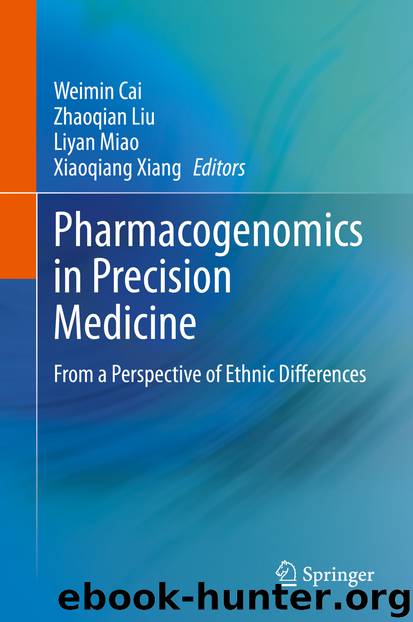Pharmacogenomics in Precision Medicine by Unknown

Author:Unknown
Language: eng
Format: epub
ISBN: 9789811538957
Publisher: Springer Singapore
8.2.2 Aspirin
Aspirin is recommended as a first-line antiplatelet drug. Due to its widespread availability, low cost, lack of major adverse effects, and familiarity to both physicians and patients, aspirin is the most commonly used antiplatelet agent worldwide. However, studies have revealed that in certain cases, the platelet function was inadequately inhibited, thereby leading to thrombotic events despite of the standard dose of aspirin, resulting in a range of individual response to aspirin therapy. This phenomenon has been termed aspirin resistance. Studies have observed that 5–65% of patients with ischemic stroke has aspirin resistance. Today, the underlying mechanism of aspirin resistance is still controversial, but it has been argued that genetic factors may be an important factor.
Aspirin inhibits platelet function through platelet cyclooxygenase-1 (COX-1) suppression, ultimately resulting in a decreased amount of TXA2. TXA2 is responsible for activation of platelet aggregation by binding to its specific receptor (TXA2 receptor, encoded by TBXA2R). Therefore, polymorphisms in this pathway may affect response to aspirin therapy. As the primary target of aspirin, COX-1 makes a logical enzyme for pharmacogenetic investigation. Polymorphisms in the COX1 gene, PTGS1, have been associated with variable response of platelet aggregation to aspirin. TXA2 receptor polymorphisms have also been associated with variation in aspirin response. The TBXA2R CC (rs1131882) genotype was found more frequently in the aspirin resistant group (81.8% vs 62.4%) than in the sensitive group and was identified as a risk factor for aspirin resistance (odds ratio = 2.712, 95% CI: 1.080–6.810) with a higher level of AA-induced platelet aggregation [6]. Fujiwara showed that aspirin was less effective for 924T homozygote of a TXA2 receptor and 924T>C (rs4523), suggesting that 924T allele is involved in aspirin resistance. However, there is some discordance in the literature, and others have not found a convincing association of variants and aspirin response [7].
Download
This site does not store any files on its server. We only index and link to content provided by other sites. Please contact the content providers to delete copyright contents if any and email us, we'll remove relevant links or contents immediately.
Life 3.0: Being Human in the Age of Artificial Intelligence by Tegmark Max(5555)
The Sports Rules Book by Human Kinetics(4385)
The Age of Surveillance Capitalism by Shoshana Zuboff(4291)
ACT Math For Dummies by Zegarelli Mark(4046)
Unlabel: Selling You Without Selling Out by Marc Ecko(3662)
Blood, Sweat, and Pixels by Jason Schreier(3623)
Hidden Persuasion: 33 psychological influence techniques in advertising by Marc Andrews & Matthijs van Leeuwen & Rick van Baaren(3565)
The Pixar Touch by David A. Price(3437)
Bad Pharma by Ben Goldacre(3427)
Urban Outlaw by Magnus Walker(3395)
Project Animal Farm: An Accidental Journey into the Secret World of Farming and the Truth About Our Food by Sonia Faruqi(3221)
Kitchen confidential by Anthony Bourdain(3089)
Brotopia by Emily Chang(3053)
Slugfest by Reed Tucker(3002)
The Content Trap by Bharat Anand(2924)
The Airbnb Story by Leigh Gallagher(2854)
Coffee for One by KJ Fallon(2636)
Smuggler's Cove: Exotic Cocktails, Rum, and the Cult of Tiki by Martin Cate & Rebecca Cate(2540)
Beer is proof God loves us by Charles W. Bamforth(2461)
